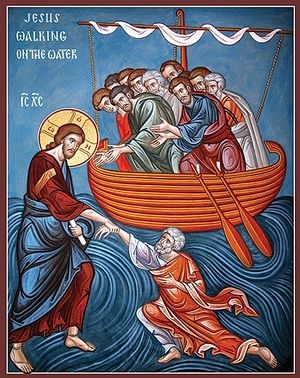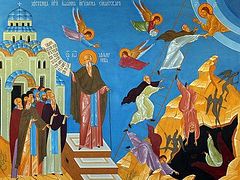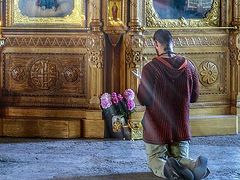1 Corinthians 3:9-17; Matthew 14:22-34
 People view the church in many different ways. Some think of it as a private club for meeting the spiritual needs of its members in a way that is ultimately self-centered and insular. Contrary to popular opinion, the mission of Christ’s Body is not to help us ignore or escape from the world, but to manifest a sign of its salvation. As members of the Savior’s Body and of one another, we must accept the challenge that St. Paul gave to the Corinthians to live as God’s fellow workers, God’s field, and God’s building. Those are all active images that require something of us. Jesus Christ is our one true foundation, but we must not simply rest content with having a foundation, any more than someone would lay the foundation for a building and then stop construction. As St. Paul wrote, “you are God’s temple and…God’s Spirit dwells in you.” Our calling is to build up the Body of Christ as a holy temple that will shine brightly in a darkened world as we journey toward the Kingdom, where the true spiritual state of our souls will be revealed.
People view the church in many different ways. Some think of it as a private club for meeting the spiritual needs of its members in a way that is ultimately self-centered and insular. Contrary to popular opinion, the mission of Christ’s Body is not to help us ignore or escape from the world, but to manifest a sign of its salvation. As members of the Savior’s Body and of one another, we must accept the challenge that St. Paul gave to the Corinthians to live as God’s fellow workers, God’s field, and God’s building. Those are all active images that require something of us. Jesus Christ is our one true foundation, but we must not simply rest content with having a foundation, any more than someone would lay the foundation for a building and then stop construction. As St. Paul wrote, “you are God’s temple and…God’s Spirit dwells in you.” Our calling is to build up the Body of Christ as a holy temple that will shine brightly in a darkened world as we journey toward the Kingdom, where the true spiritual state of our souls will be revealed.
The Apostle is not writing about a building made of wood or stone, of course, but about our common life in Christ. Both collectively and personally, we are temples of the Holy Spirit, which gives us a great obligation to cooperate with the presence and power of God in our lives. There is tremendous responsibility in having the freedom to work together with the Lord to share more fully in His life as we grow in holiness. No one will ever force us to do so, but the consequences of rejecting this high calling are profound. As St. Paul wrote, “If anyone destroys God’s temple, God will destroy him; for God’s temple is holy, and you are that temple.” He is not speaking here of burning down a building, but of the consequences of refusing to offer ourselves to Christ, of rejecting our identity as the living temples of the Lord.
Today’s gospel lesson provides a vivid example of what happens when we turn away from Christ as the one true foundation of our lives. St. Peter began to sink like a stone in a raging sea when he shifted his focus from entrusting His life to the Lord to being consumed with fear about the wind and the waves. By his own power, there was no way that Peter could have avoided drowning in this situation, but thankfully he retained the presence of mind to call out “Lord, save me!” That is precisely what the Savior did by reaching out to Peter and rescuing him as He said, “O man of little faith, why did you doubt?” The stress of the storm revealed the weakness of Peter’s faith, which is not surprising because he had gotten himself into this dangerous situation by putting Christ to the test, saying “Lord, if it is You, bid me come to You on the water.” By his prideful lack of trust, Peter literally got himself in well over his head.
Our calling is to become faithful coworkers with God by offering our lives to Him as we become holier and more beautiful temples of the Holy Spirit. That will never happen by allowing the storms of our lives to turn our attention away from the opportunities that they present for actively cooperating with God for the healing of our souls and the strengthening of the Church. Like Peter, we bring about many of our own struggles by our own thoughts, words, and deeds. Out of pride, we may be ashamed to acknowledge that we have put ourselves in a situation in which, left to our own devices, we will sink like stones. Some leave or become inactive in the life of the Church out of hurt pride when they realize the harm that they have done to themselves and their neighbors. It is easy to lose hope for building on the one true foundation of Jesus Christ when we know that we have fallen into an abyss of sin that threatens to wound us and others in profound ways.
We become too much like Peter when we relate to God based on getting what we want, which is really a way of saying that our faith is conditional. Our trust is then not actually in the Lord, but in ourselves. We may not ask to walk on the water, but we judge the importance of faithfulness to the Lord on whether He gives us the results that we want. When things do not go as we would like, the weakness of our faith becomes clear, for then we sink into doubt, despair, and a lack of commitment to find the healing for our souls. When that happens, we still have the choice of whether to drown spiritually or to come to our senses and call out “Lord, save me!” We have the choice between destroying God’s temple by further weakening our faith and separating ourselves from the Body of Christ or of calling out to the Lord in humble repentance from the depths of our hearts. Remember that He had compassion on St. Peter, the thief on the cross, and the tax collector, who could only say “God, have mercy on me, a sinner.” We must trust that He will do the same for us when we approach Him with the same spiritual clarity as they did.
As Orthodox Christians, we never encounter the Lord simply as isolated individuals, but as members of His Body, the Church. We have put Him on in baptism, become temples of the Holy Spirit through chrismation, and received His Body and Blood in the Eucharist. We are members of Him and of one another. He is the vine and we are the branches. If we find ourselves spiritually weak, confused, and uninterested, we should take a clear look at our relationship with Christ in His Body, the Church. It is through conscientious participation in the full sacramental and ascetical life of the Church that we will open ourselves to receive the strength to offer ourselves to God as His fellow workers, field, and building. If we take the life of the Church for granted or separate ourselves from it, we risk destroying our integrity as God’s temple. We step away from our one true foundation and put ourselves in a place where can easily sink like stones.
Our small parish is not simply an association of people who share a common faith. Neither are we merely a non-profit institution that owns land and a building and has programs of various kinds. As hard as it may be to believe, this community manifests the fullness of the Body of Christ and provides us with everything necessary for the healing of our souls. We enter mystically into the Kingdom of God in every celebration of the Divine Liturgy and participate personally in the healing divine energies of the Savior through the holy mysteries. We are members of His Body and temples of the Holy Spirit, both collectively and personally. Absolutely nothing other than our own prideful refusal can keep us from building a life of holiness on the one true foundation of Christ available to us in this parish.
Peter learned the hard way not to put Christ to the test, and we must not make our active participation in the Church conditional upon any preconceived notions of how religion should fit into our lives or what we want from God. The point is not that we fit God into our lives, but that we offer ourselves to participate more fully in His. People involved in construction or farming have to work hard if they are to produce anything worthwhile. Should it be surprising that the same is true of the members of the Church, for our goal is nothing less than to become radiant with the holiness of God as a sign of the salvation of the world?
Before this high vision of our life together in the Church, we should each cry out with the spiritual clarity of sinking Peter, “Lord, save me!” He will raise us up and provide us the strength to build upon Him as our one true foundation in a fashion that will withstand even the most dangerous winds and waves of our lives. When Peter later confessed “the Christ, the Son of the living God,” the Savior said, “upon this rock I will build my church; and the gates of hell shall not prevail against it.” (Matt. 16: 16-18) The one true foundation is Christ Himself, Who shares His victory over sin, death, and Hades with us through His Body, the Church. Let us unite ourselves to Him in the ministries of our common life in this parish. Remember what St. Paul wrote, “God’s temple is holy, and you are that temple.” Let us find the healing of our souls together as members of the Body of Christ.



